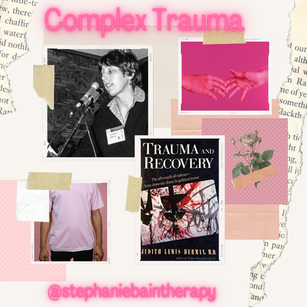|
Complex PTSD (or Complex Post-Traumatic Stress Disorder, or Complex Trauma) is getting more attention. As a trauma therapist in Oakland, CA, this is how I define and describe C-PTSD. Complex Post-Traumatic Stress Disorder (C-PTSD) is a psychological reaction to trauma that can develop as a result of prolonged or repeated exposure to traumatic events, particularly in interpersonal relationships. It is often associated with experiences such as childhood abuse, neglect, or prolonged trauma, for example being in an abusive relationship. PTSD versus C-PTSD While PTSD typically arises from a single traumatic event (think one assault, one car accident), C-PTSD stems from ongoing and repetitive traumatic experiences--often in the context of relationships. These experiences can include physical, emotional, or sexual abuse, neglect, exploitation, captivity, or situations where the person feels trapped or unable to escape. This is why some people who have had all their material needs met, but have been invalidated and exposed to emotional abuse or adults fighting have trauma reactions. C-PTSD and the DSM The DSM (Diagnostic and Statistical Manual of Mental Disorders). The DSM provides a standardized framework and criteria for the classification, diagnosis, and treatment of mental disorders. C-PTSD is not in the DSM and is part of the reason people struggle to fully understand it--it's not a diagnosis you can get! Judith Herman is an American psychiatrist and renowned expert in the field of trauma. Herman's research and clinical work have focused on understanding the complex dynamics of trauma, particularly in the context of interpersonal violence, such as domestic violence and sexual assault. She has emphasized the importance of recognizing the long-term effects of trauma, including the development of C-PTSD, and the significance of providing trauma-informed care and support. Pete Walker is another prominent figure known for his work on understanding and treating Complex Trauma. Pete Walker's approach to C-PTSD is rooted in his own personal experience of recovering from the disorder. He combines his professional expertise with his personal journey to offer a comprehensive understanding of C-PTSD and practical strategies for healing and self-care. "Many dysfunctional parents react contemptuously to a baby or toddler’s plaintive call for connection and attachment. Contempt is extremely traumatizing to a child, and at best, extremely noxious to an adult. Contempt is a toxic cocktail of verbal and emotional abuse, a deadly amalgam of denigration, rage and disgust. Rage creates fear, and disgust creates shame in the child in a way that soon teaches her to refrain from crying out, from ever asking for attention. Before long, the child gives up on seeking any kind of help or connection at all. The child’s bid for bonding and acceptance is thwarted, and she is left to suffer in the frightened despair of abandonment. Particularly abusive parents deepen the abandonment trauma by linking corporal punishment with contempt." ― Pete Walker Potential Causes of C-PTSD:
“Emotional neglect, alone, causes children to abandon themselves, and to give up on the formation of a self. They do so to preserve an illusion of connection with the parent and to protect themselves from the danger of losing that tenuous connection. This typically requires a great deal of self-abdication, e.g., the forfeiture of self-esteem, self-confidence, self-care, self-interest, and self-protection.” ― Pete Walker PTSD and C-PTSD look different. Sometimes the presentation of Complex Trauma looks like personality disorders like BPD. I think of the diagnosis BPD as a cluster of symptoms that can arise as a response from trauma; Complex PTSD is potentially a way to describe what people with "personality disorders" experience in a non-pathologizing, trauma-informed way. Judith Herman's seminal book, "Trauma and Recovery: The Aftermath of Violence - From Domestic Abuse to Political Terror," published in 1992, has been highly influential in shaping the field of trauma studies. In this book, she examines the psychological and social impact of trauma and provides a comprehensive framework for understanding and addressing the effects of trauma on individuals and communities. “It leads to a shamed and damaged sense of self, disrupted interpersonal relationships, and shattered systems of meaning...Shame is one's vicarious experience of the other's scorn.” ― Judith Herman Common Symptoms of Complex PTSD:
Judith Herman’s Complex Trauma Definition From Trauma and Recovery: The aftermath of violence – from domestic abuse to political terror by Judith Herman (you can read the whole book for free here) A history of subjection to totalitarian control over a prolonged period ( months to years ). Examples include hostages, prisoners of war, concentration-camp survivors, and survivors of some religious cults. Examples also include those subjected to domestic battering, childhood physical or sexual abuse, and organized sexual exploitation.
The Experience of Complex Trauma:Based on the work of Pete Walker Looking from a trauma therapist in Oakland, CA? Learn more here. Looking for a queer couples therapist in Oakland, CA? Learn more here. What is complex PTSD?
0 Comments
Leave a Reply. |
AuthorStephanie Bain, LMFT Archives
April 2024
Categories
All
***Resources are not a substitute for therapy and are not intended for making diagnoses or providing treatment. Not all practices and tools are suitable for every person. Please discuss exercises, practices, and tools with your individual therapist or health care provider.
|


 RSS Feed
RSS Feed